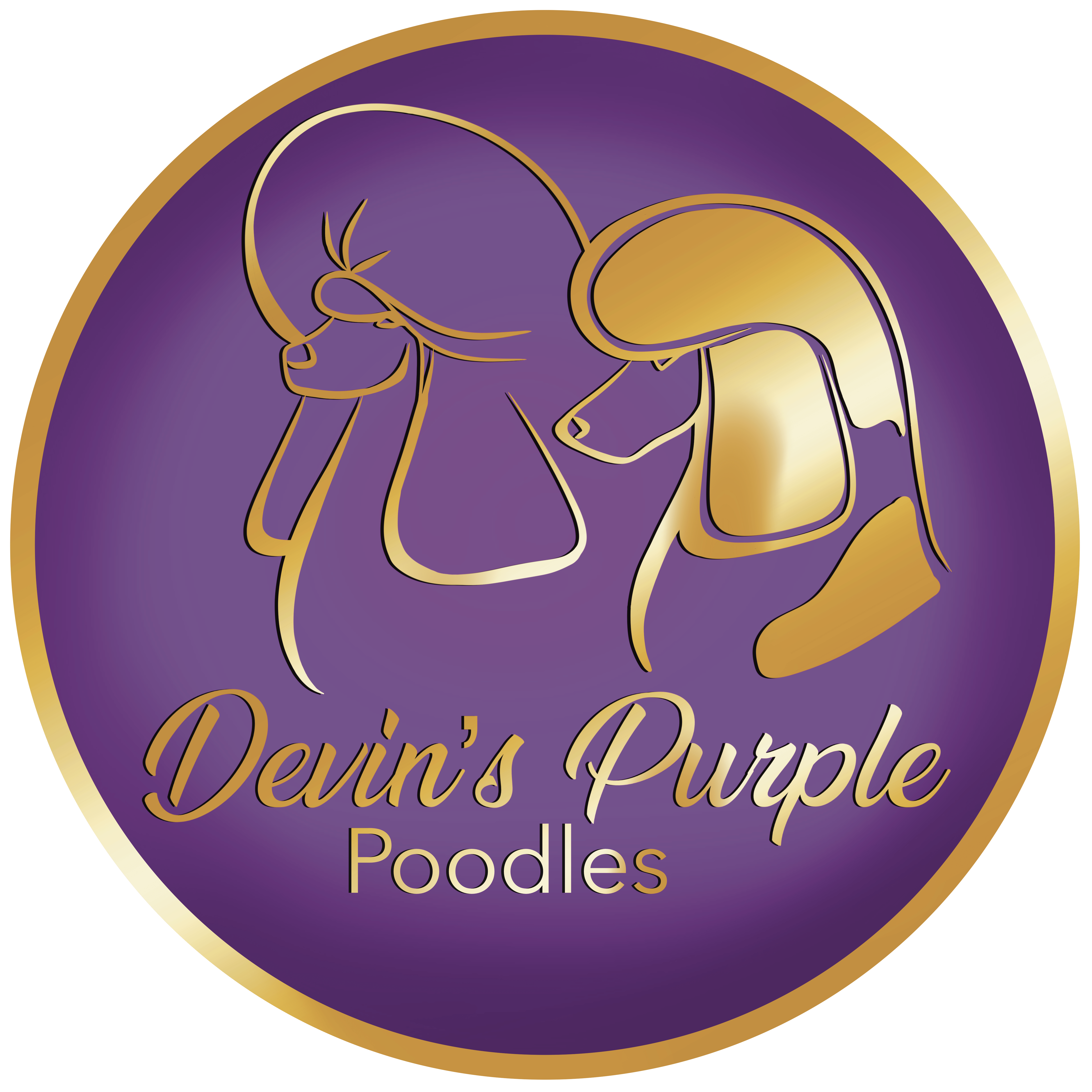Devin’s Purple Poodles
Puppy Development
Early Learning Experiences
Early learning experiences have profound implications for later success in life. From birth to seven weeks is the time when the greatest changes, physically and behaviorally take place and a time when basic personality is shaped. The most influential time of a puppy’s life is between three and six weeks. Fear is not present in newborn puppies. It begins to develop slowly around five weeks of age, and increases gradually until it escalates in the fear imprint period during the eighth week. Because experiences are permanently ingrained during this time, we also work with puppies to develop their problem-solving abilities, mental agility and mental coordination. It’s a perfect time to begin their assistance dog training too! Read below about the way we develop our puppies here at Devin’s Purple Poodles & Cockers.
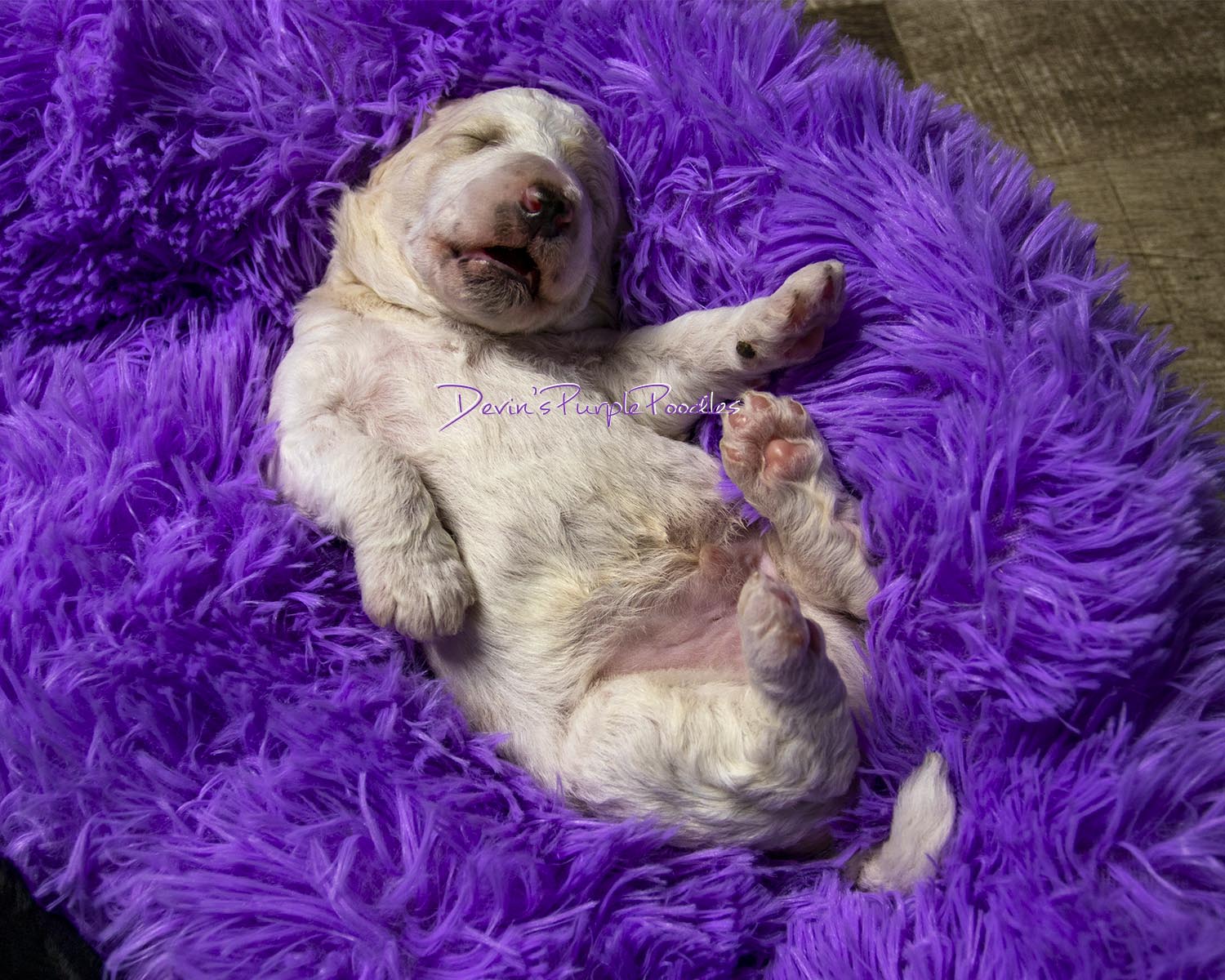
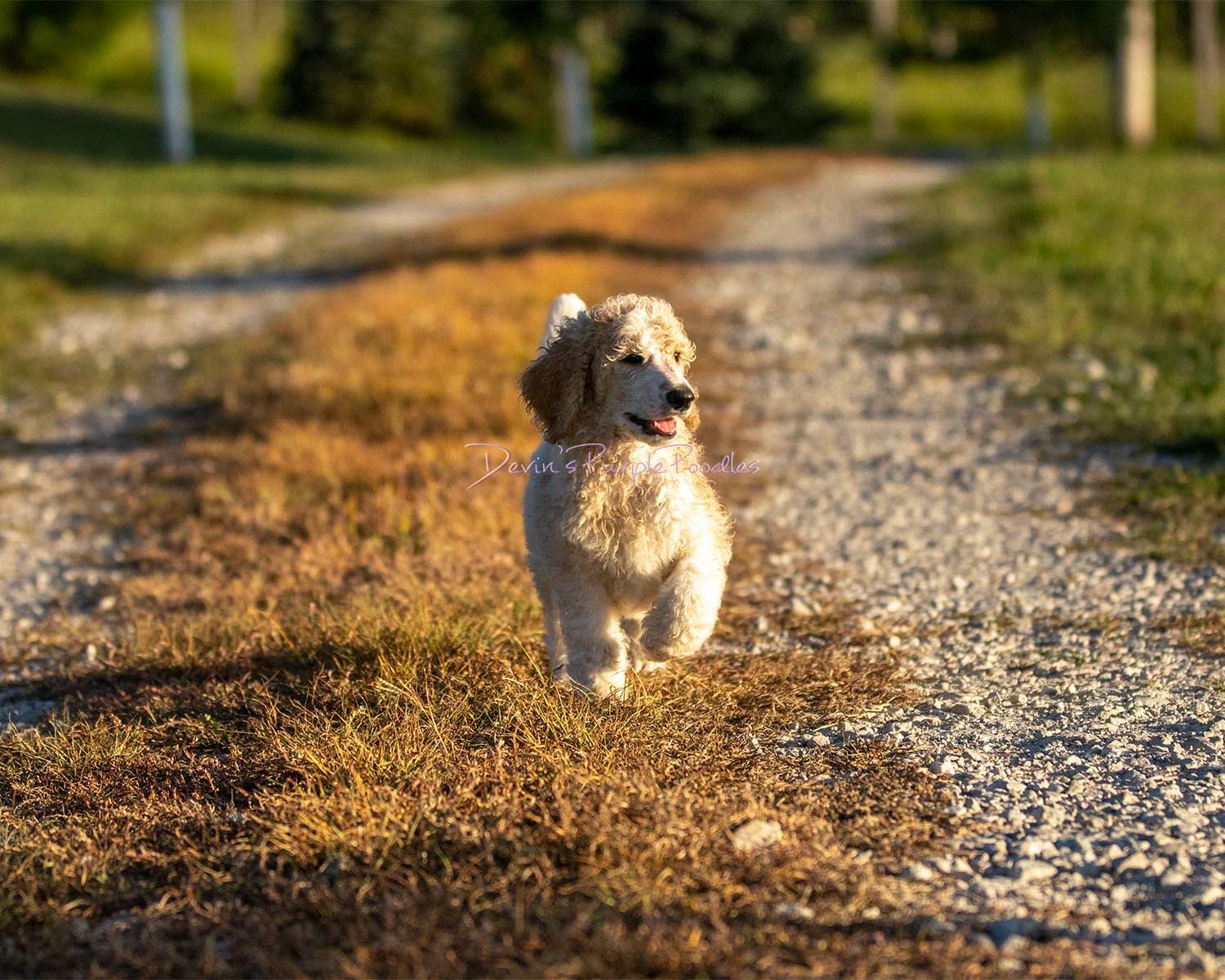
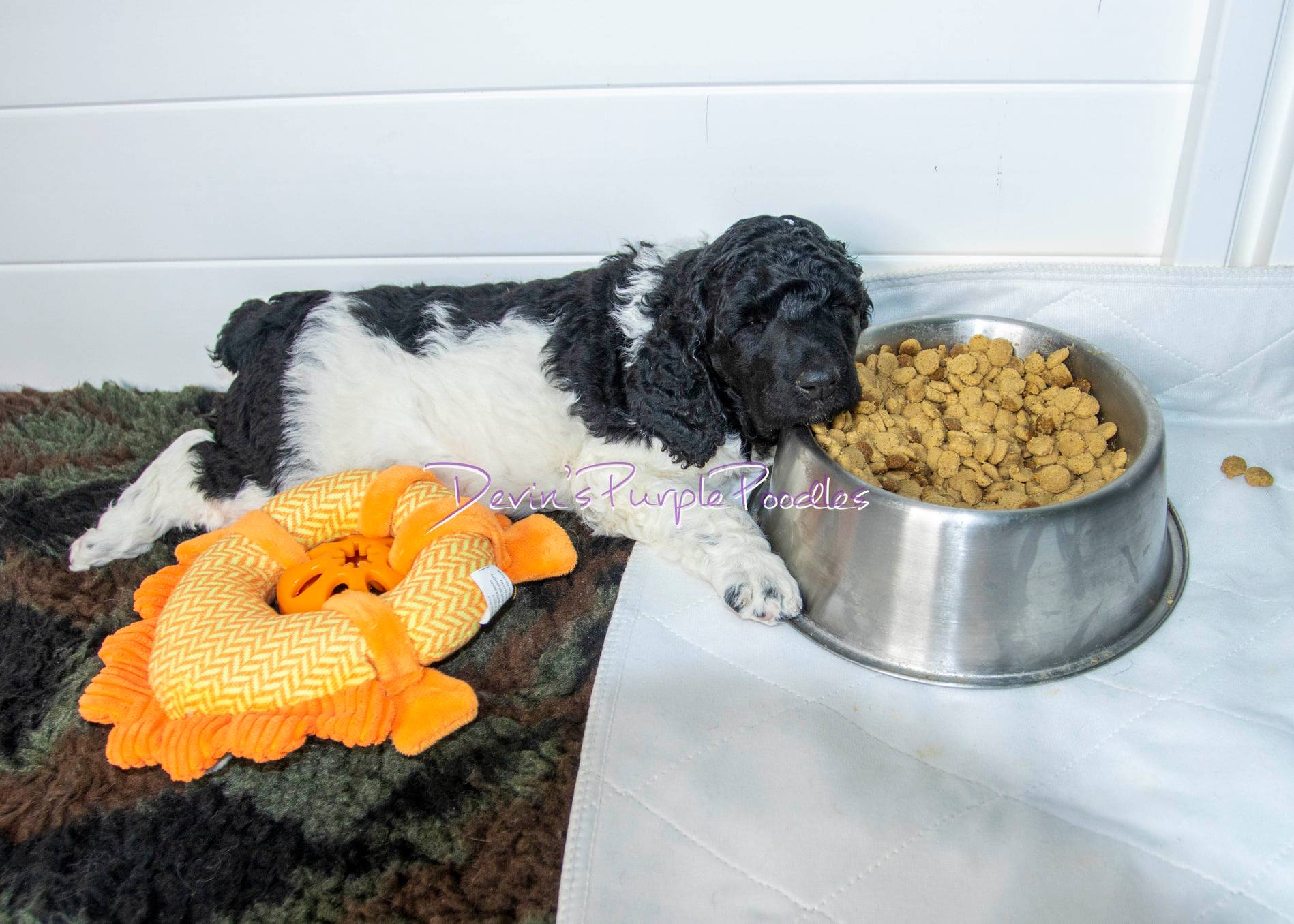
Nutrition
My breeding poodles are currently on high quality kibble and we also feed RAW. Nursing moms may get extra supplementation to produce a good milk supply, such as Oral Cal Plus calcium, B Strong, canned food and RAW. With my puppies, I introduce RAW and Foster Care milk supplment around 3 weeks old. Then around 5 weeks we intro kibble for one meal. Each litter of pups may be different as to how quickly they are eating the kibble dry.
Early Neurological Stimulation
Early Neurological Stimulation (ENS) is time sensitive and must be performed from the third to the 16th days of a puppy’s life.
The process consists of 5 simple exercises that introduce mild stressors that stimulate the neurological system: tactile stimulation, lying in the supine position, held with head held up, tilted upside down, and thermal stimulation. Each exercise is done for 3-5 seconds.
Five benefits have been observed in canines that experienced ENS:
 Improved cardio vascular performance (heart rate)
Improved cardio vascular performance (heart rate)
 Stronger heart beats
Stronger heart beats
 Stronger adrenal glands
Stronger adrenal glands
 More tolerance to stress
More tolerance to stress
 Greater resistance to disease
Greater resistance to disease
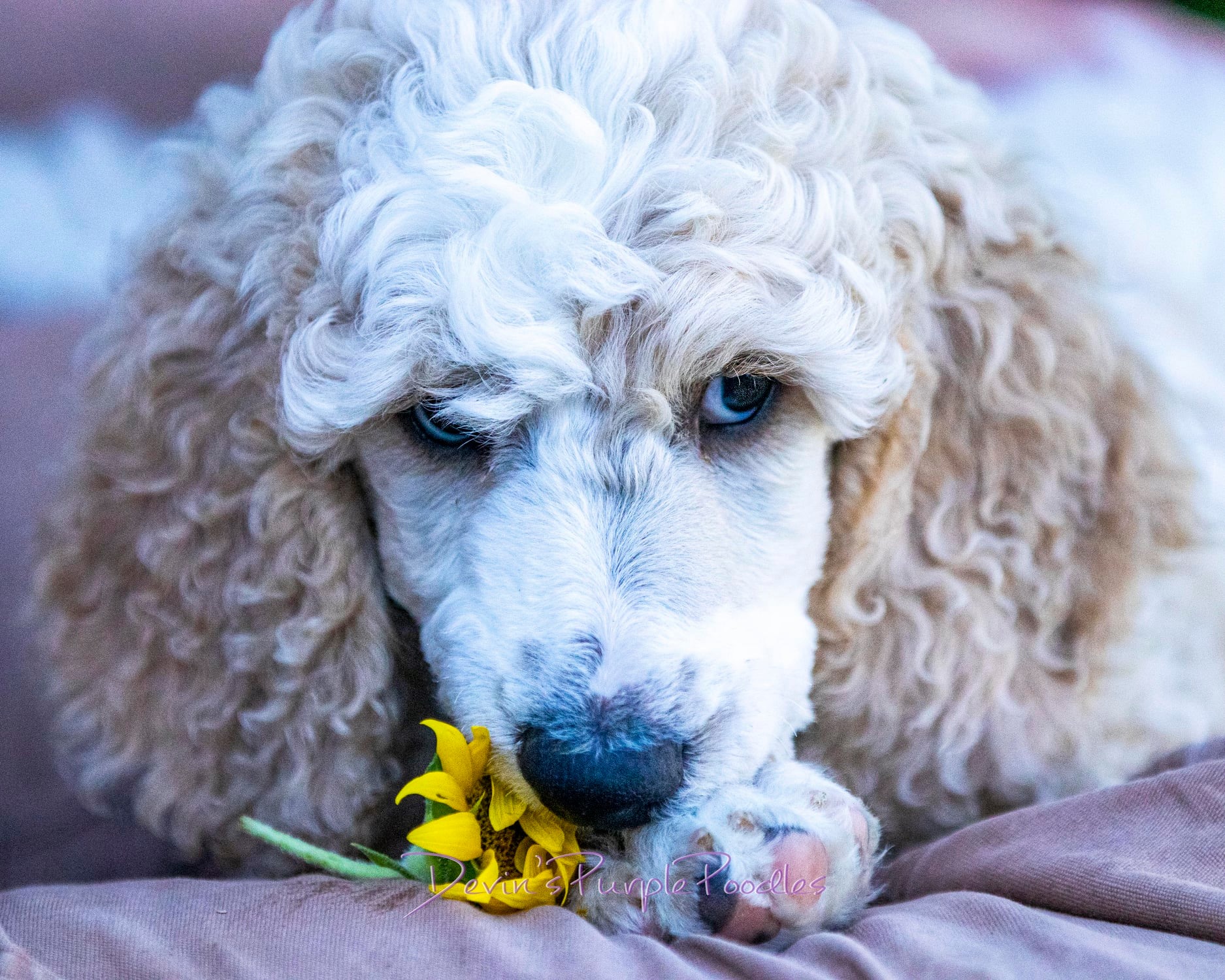
Early Scent Introduction
Early Scent Introduction (ESI) is also time sensitive and must be performed from the third to the 16th days of a puppy’s life.
Neonatal puppies, from 3 to 16 days of age, are ready and able to smell their world. You can take advantage of this to improve their adult scenting ability by doing Early Scent Introduction with your litter. ESI has contributed to our dogs’ successes in, nosework, and Barn Hunt
See video of this HERE.
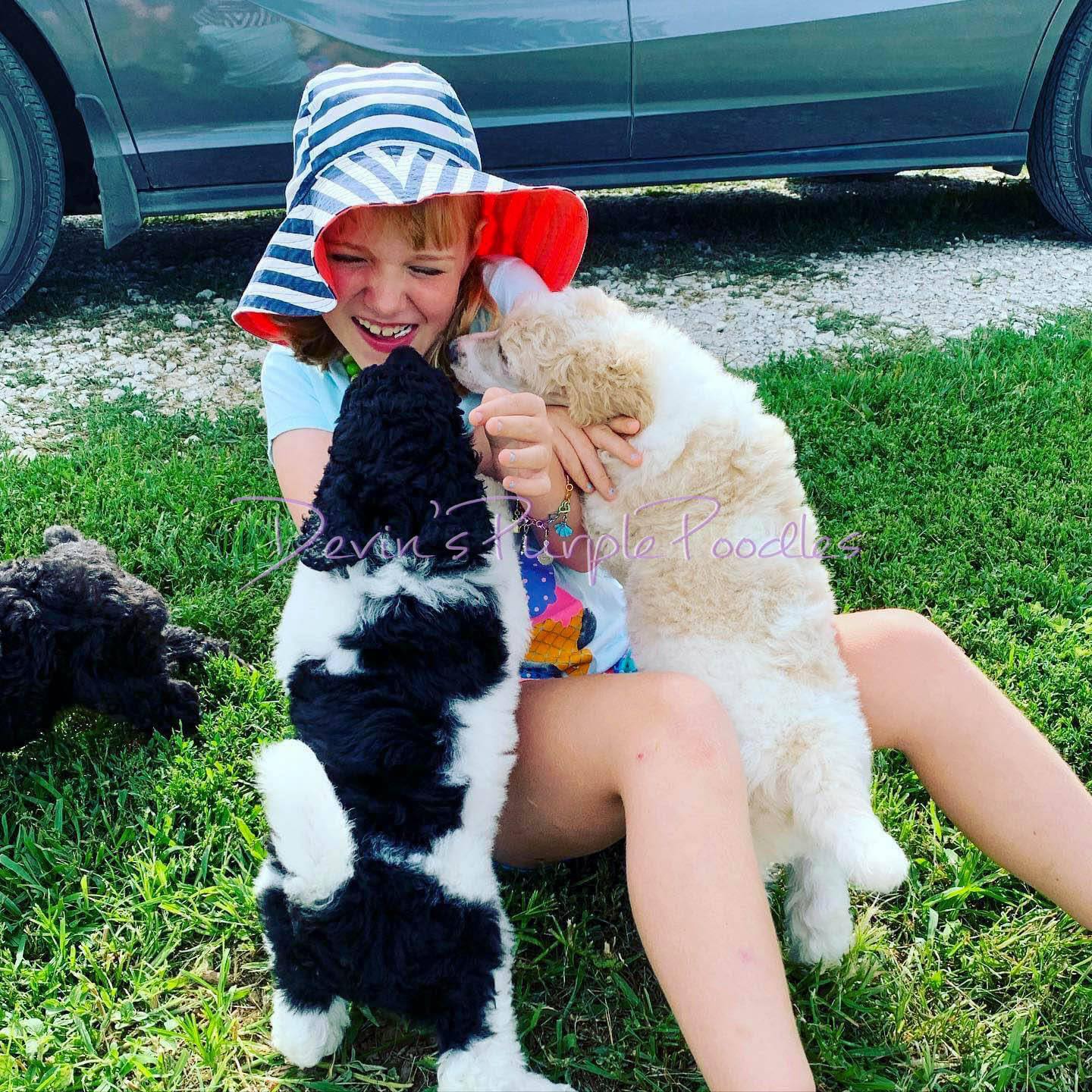
Socialization to People and Kids
In addition to my husband and I handling pups from birth, we have friends visiting and handling puppies from early on in a pup’s life. When the pups are a bit older, we may have local puppy buyers visit and play with the litter. We also borrow our friend’s kids so our pups get to hear, feel, and see what kids are like.
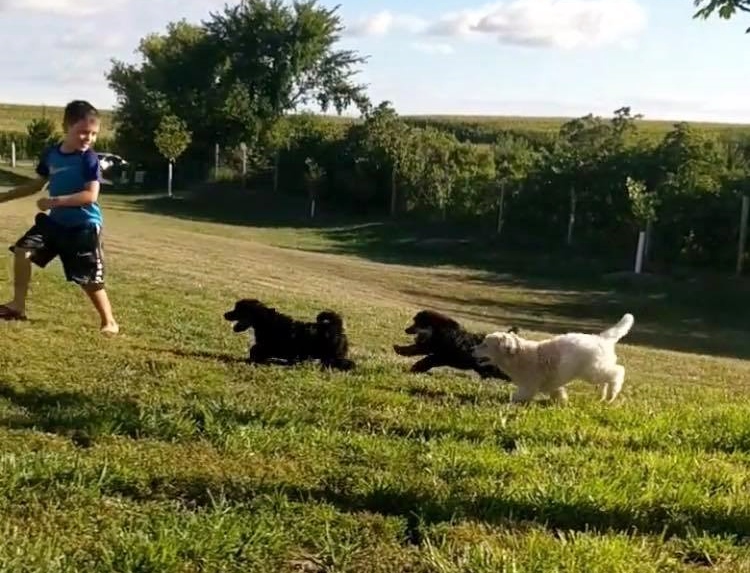
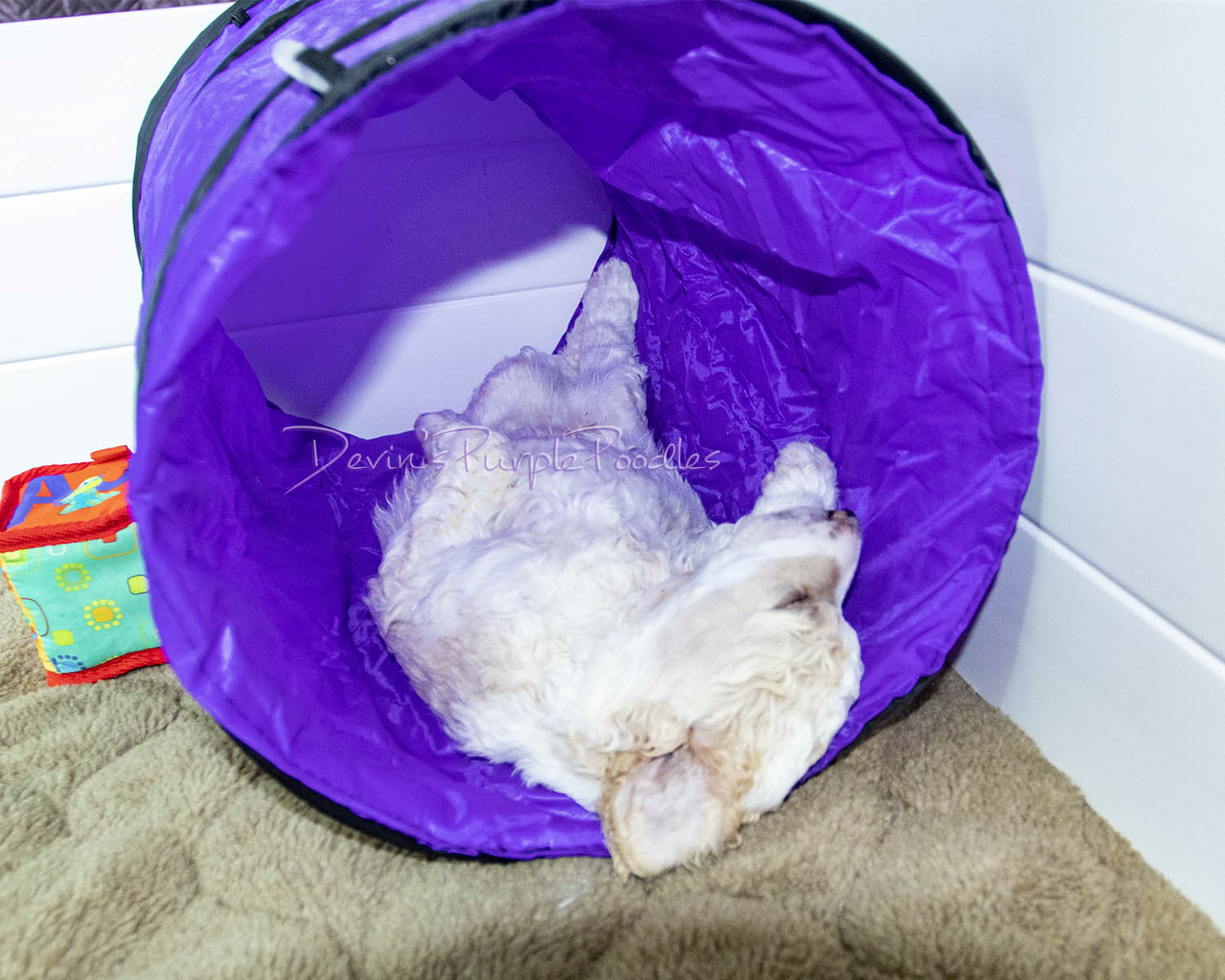
Novel Experiences and Items
Puppies exposed to novel experiences and frequent novel items in their environment early on tend to create more neuronal connections in their brains and deal with stress better later on in life. It also helps builds confidence. New experiences are things like walking around on different textured surfaces, exploring different rooms, meeting new people, interacting with new dogs, hearing new sounds, smelling new scents, first solid meal, different bowls to eat or drink out of, standing on the grooming table the first time, first bath, first face shave, walking over a slide, going through a tunnel, balancing on a wobble board, first car ride, first vet visit and so on. New items can be the first toy, each new toy, a krinkly item, a tarp, a tunnel, a ball, a swing, the first time puppy pads or crates are put in their area, wobble boards, adventure boxes, fit bones, squeaky toys, chew bones, and so on. Some things can be both a new item and a new experience such as seeing their first tunnel in their environment, then exploring it and figuring out you can go through it, drag it around, make krinkle sounds with it, or take a nap in it.
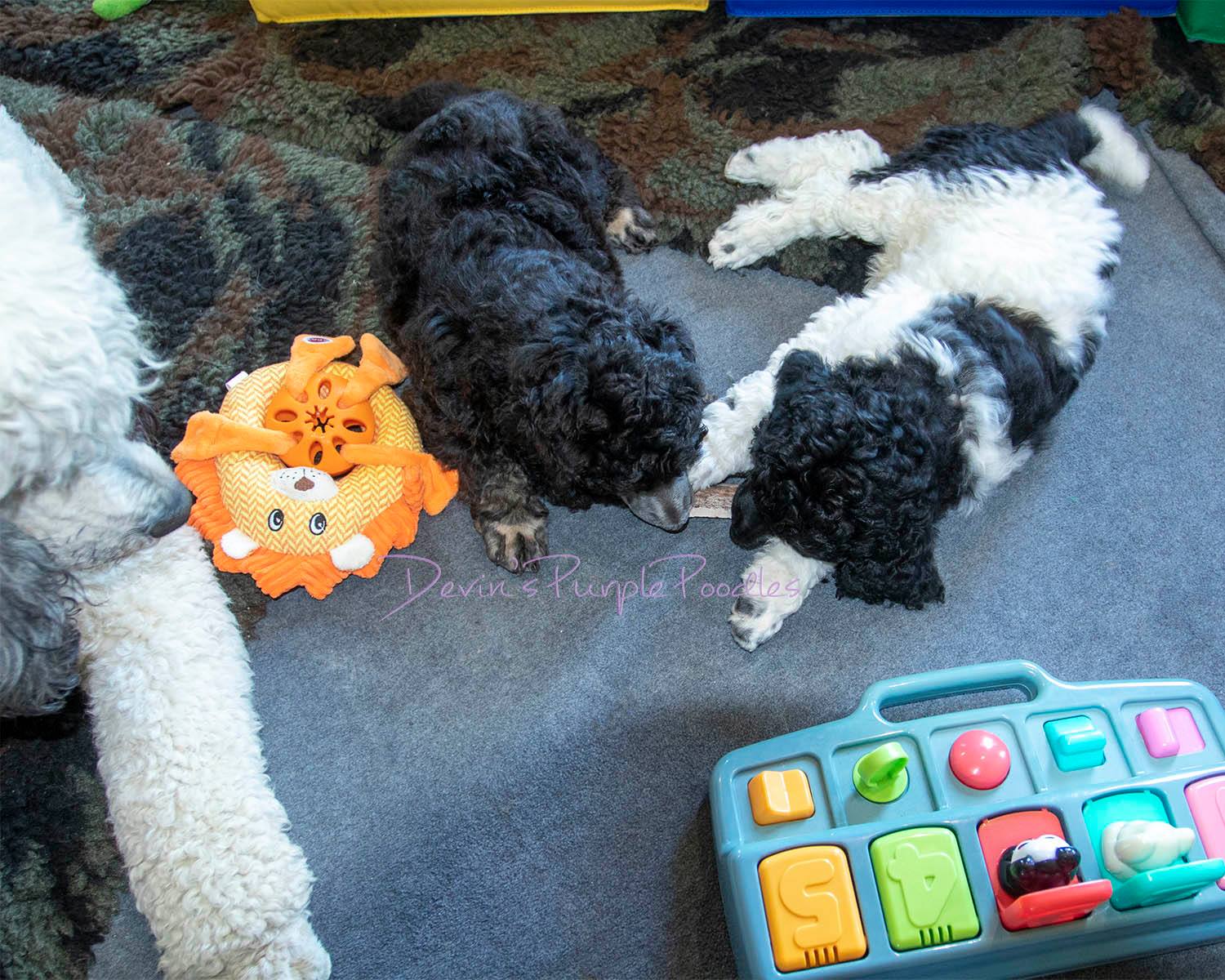
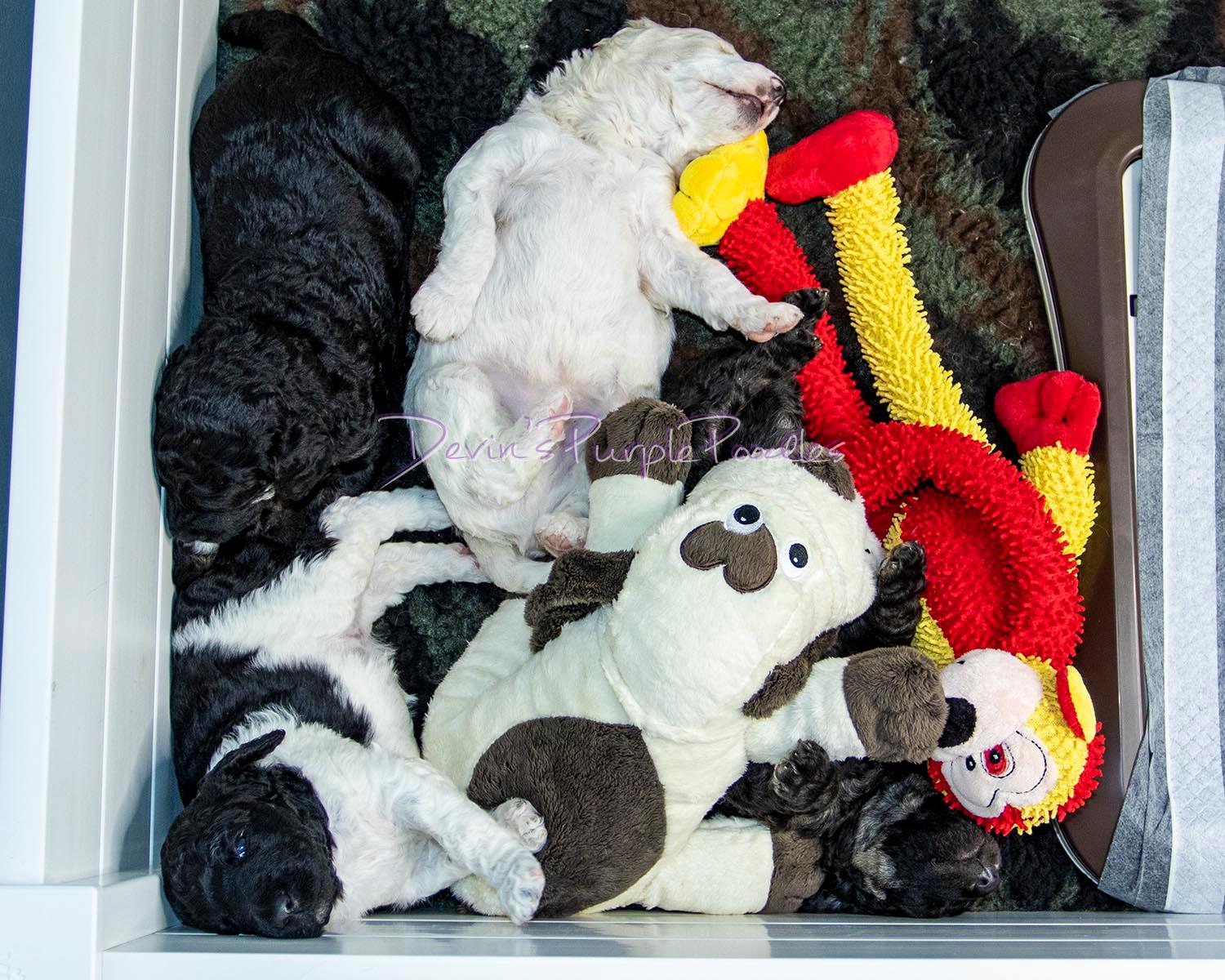
Socialization With Friendly Adult Dogs
The pups learn a lot from their mother but we also like to let them experience as many other friendly adult dogs as we can. This is usually our own adults in our household and potentially our adolescent pups in a supervised manner. The more positive other dog experiences they have the more confident and socially smart they will be in their future interactions with strange dogs.
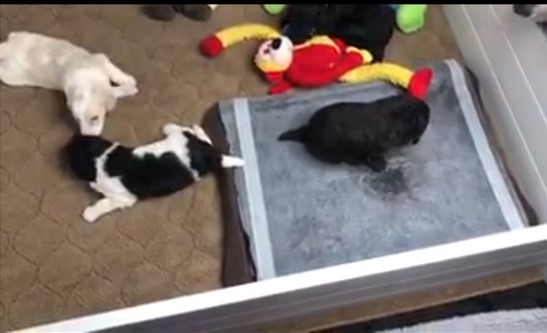
Potty Training Foundations
We add potty pads into the whelping box at around 2.5 weeks, usually as soon as the pups start walking around. Later, around 3-4 weeks we will add articial turf or pellets in a litter box. We work on keeping their area clean, expanding their area slowly, and they began using the potty area more realiably as they grow. For litters born during warmer weather we will also give them some outside potty sessions. In our cold Nebraska winters, they may use articial turf inside predominantly and only go out for rare short exploration in the snow. While your pup will not go home housetrained, the foundation here with both potty training and crate training will give them a great headstart.
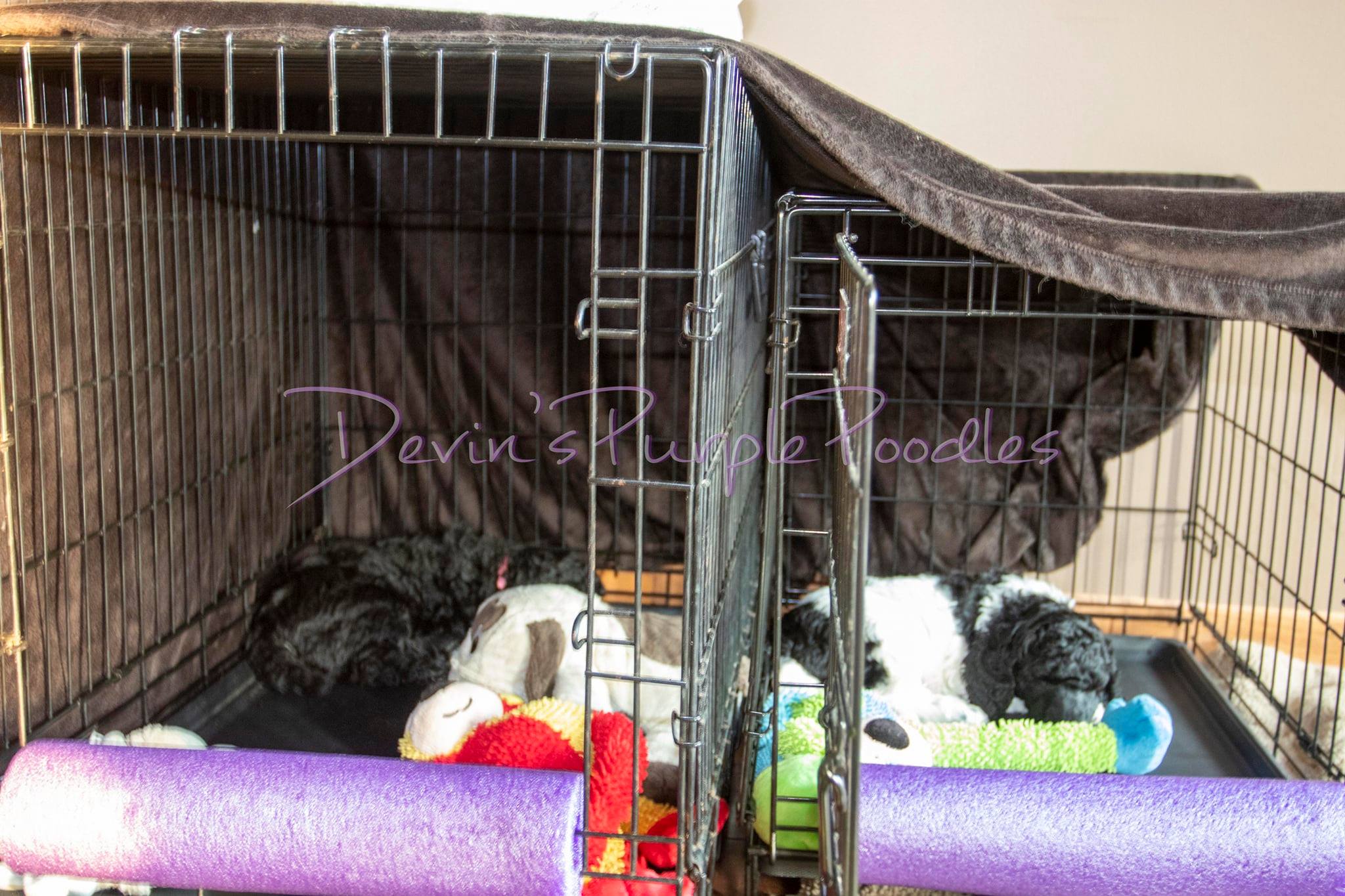
Crate Training Foundations
We add one or more crates into the puppy area around 3 weeks with the doors left opened or removed. The pups naturally go in to nap on comfy bedding or explore toys. Often the entire litter will pile into one! Later, around 6 weeks, we may have sessions putting the pups in with doors closed for a very brief period with a chew toy or bone with the intent to build up their tolerance very slowly. At 7 weeks they will start sleeping with a buddy overnight and let out to potty. Each pup will experience sleeping alone in the crate a few times before going home. They will still miss their litter mates and may cry that first night completley away from their siblings, but the foundation here should make things a bit easier.
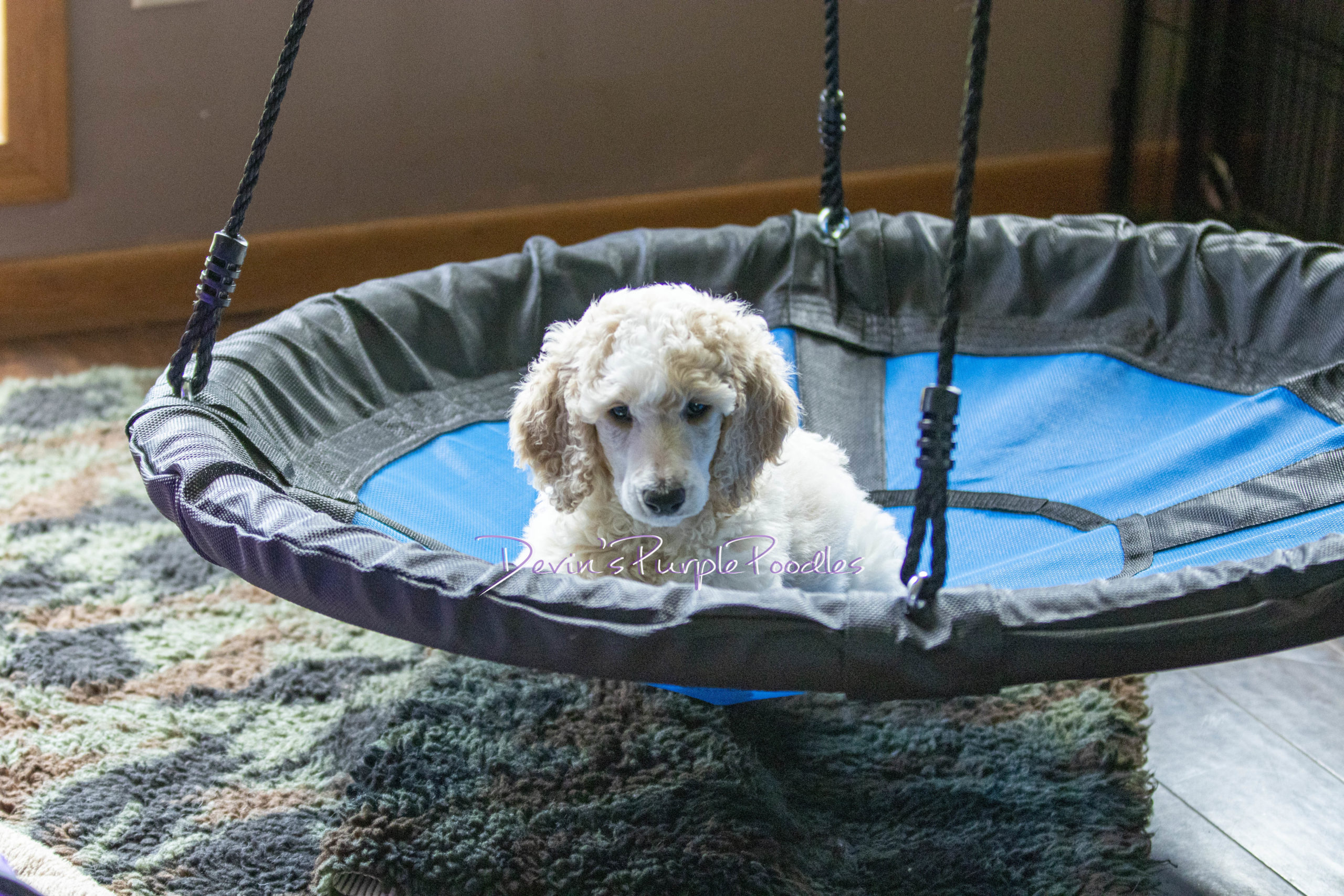
Unbalanced Surfaces
While also falling under novel experiences, unbalanced or wobbly surfaces are great for building confidence, coordination and greater body awareness in pups. We have a fabulous swing that the pups love to play in, fitbones, and wobble boards for them to balance on.
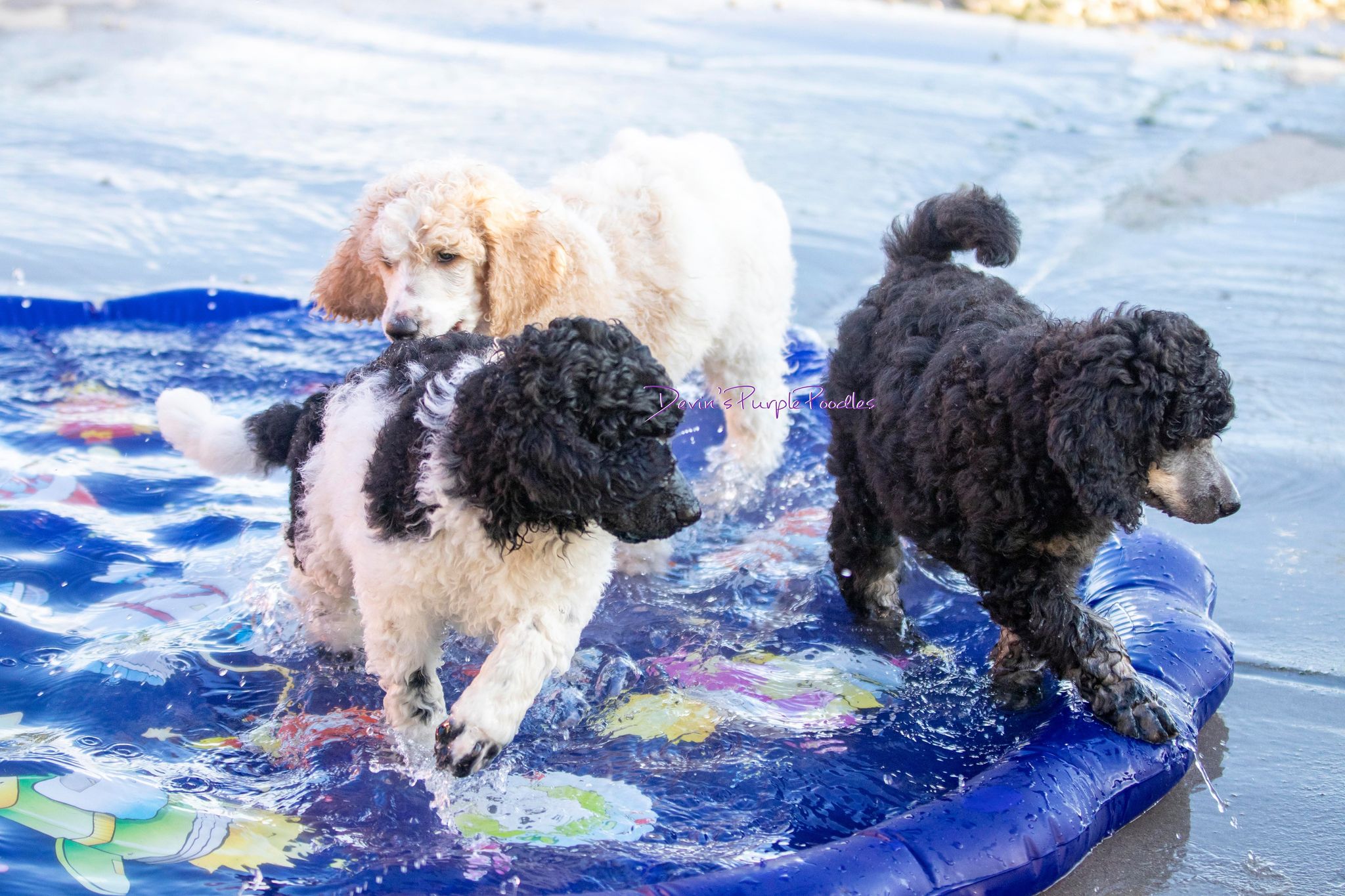
Water Poodles
Poodles were historically water retrievers. We expose our puppies to water early with a crate tray filled with shallow water at around 4 weeks and later put in a shallow pool for them to play in outside when weather permits.
Beginning Training
We do teach a basic sit command and do leash training with the puppies. However, all the great experiences they have here primes them to be confident and ready to work with their humans once they go home.
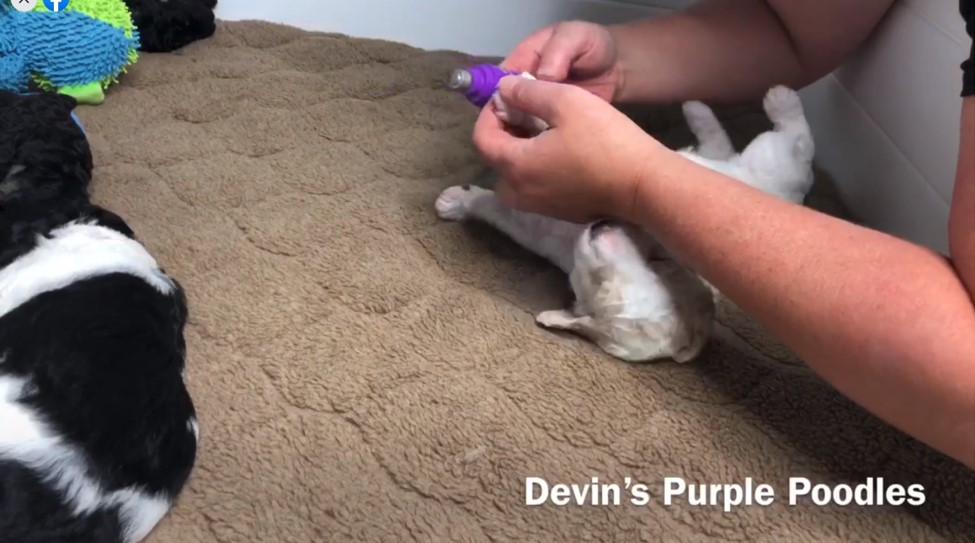
Beginning Nail Grinding
We start the puppies at 3 or 4 days old grinding or clipping their nails every couple days. It helps keep nails short so they don’t scratch mom and desensitizes them to the vibration. Your groomer will love you for it!
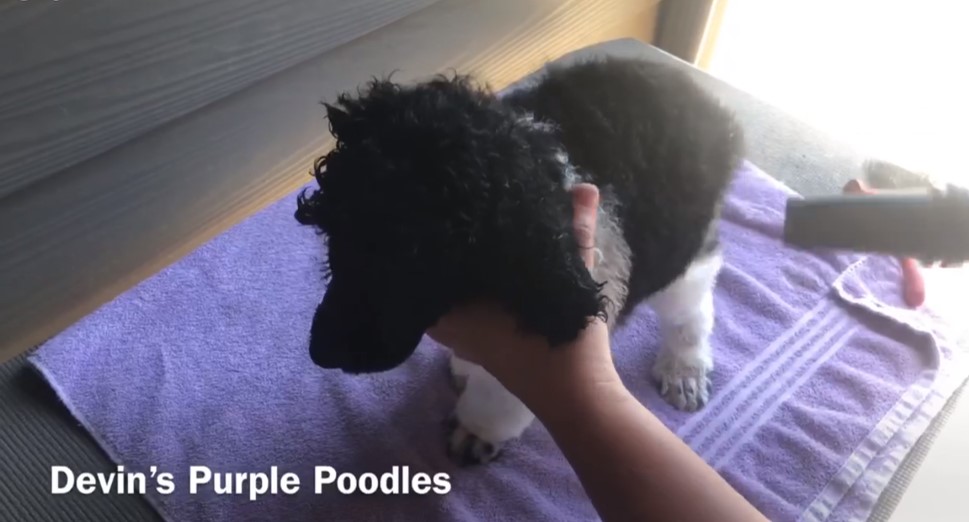
Grooming Experiences
Our approach to grooming baby puppies involves desensitization early on to the vibration of the clippers and the feel of the blow dryer. They may get a face shave as early as 2-3 weeks and then every week or so until they go home. While pups may need some little cleanups, full bath and blow drys on the grooming table usually don’t start until about 5 weeks old. Feet shave will be done 3 or 4 times before they go home, with the first couple being a quick skim and eventually clean feet.
Sound Desensitization
We play white noise for our puppies as it has a calming effect on them. Whenever we can, we expose the pups to small doses of actual environmental sounds, such as the typical house sounds, TV, kitchen appliances, hair dryer, vacuum, storms, fireworks, etc. We also use an app for at least an hour per day that has lots of different sounds an adult dog will be exposed to in its lifetime. The intent is to help desensitize the pups from scary or startling noises early in life.
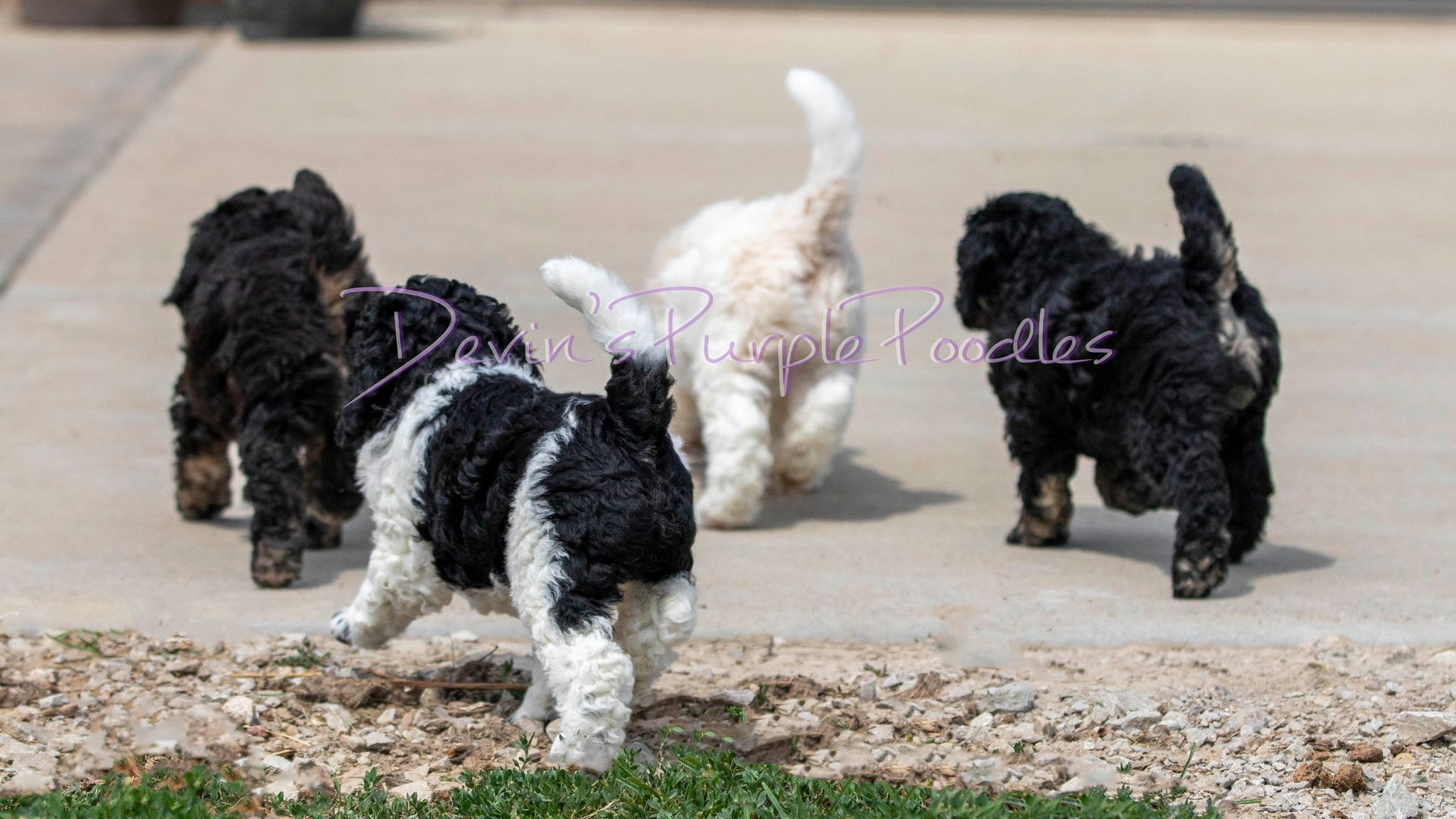
Outside Exploration
When weather permits, we like to let our pups run, sniff, stroll, and climb over things to learn about the outside world. They also may interact with other dogs and their humans outside, and learn to play with their Mom. It also helps them decompress and have less litter mate squabbles. Also, they will usually potty outside either before or after a play/exploration session.
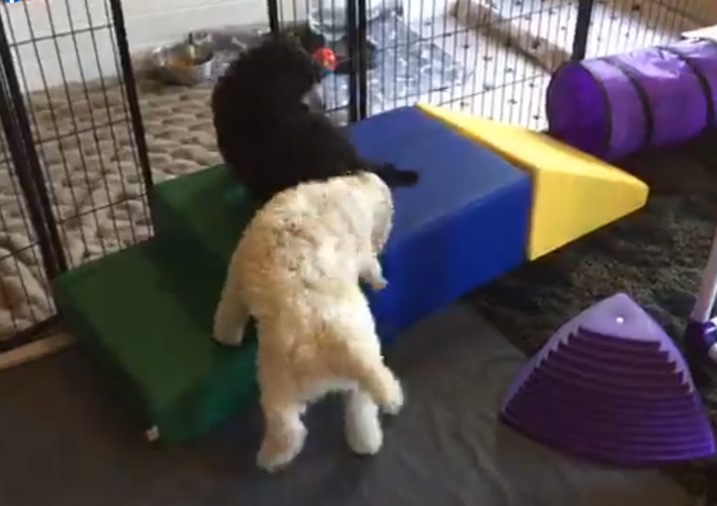
Stair Training
While we pay attention to not overdoing any exercise with young developing puppies, we also realize that some pups go home and have stairs to navigate in order to get to their potty area. So, we train the pups to go up and down stairs. Often they learn naturally through playing.
Later Scent Exercises
We mentioned earlier that our puppies are introduced to early new scents at the same time as ENS. We also later may have them follow kibble scent trails, find kibble rolled up into towels, hidden in treat balls, or in a snuffle matt. My adult dogs do nosework and I’m always looking for ways to get puppies started early.
Enrichment in Puppy Play Area
We have already mentioned benefits of novel items and experiences, unbalanced surfaces, potty training and crate expereinces, etc., for developing confident puppies with good habits. We pay attention to how our puppy area is put together with lots of enrichment items and opportunities for puppy interactions with their environement, items in it, and each other. We also get to learn a lot about each puppy as we are watching these interactions.
They are also so darn adorable, arent they? 🙂 We want our puppy parents to get to know and love their future pups by being able to watch them in their environment through our many videos and pictures.
Follow Us
